HK police under fire: A lesson on how public trust in S'pore’s security forces can fade fast, says Shanmugam
SINGAPORE — The backlash that the Hong Kong police are facing over its handling of ongoing protests in the city is an example of how trust in law enforcement officers can erode very quickly if not managed well, said Law and Home Affairs Minister K Shanmugam.
Speaking at an awards presentation ceremony for Home Team officers on Sept 30, 2019, Law and Home Affairs Minister K Shanmugam (pictured) said that the protests in Hong Kong have taught him three key lessons.

Quiz of the week
How well do you know the news? Test your knowledge.
SINGAPORE — The backlash that the Hong Kong police are facing over its handling of ongoing protests in the city is an example of how trust in law enforcement officers can erode very quickly if not managed well, said Law and Home Affairs Minister K Shanmugam.
He also warned that here in Singapore, even though surveys show that most people trusted its Home Team officers, this should not be taken for granted.
Speaking on Monday (Sept 30) at an awards presentation ceremony for the Home Team officers, which include police, civil defence and immigration officers, Mr Shanmugam described the Hong Kong police as a “disciplined, highly professional” force and one of the best in Asia.
Yet that reputation has disappeared in a matter of a “few weeks” and its relationship with the Hong Kong people has become “severely strained”.
He attributed this shift in perception to the many different narratives propagated by the Hong Kong and international media, as well as social media platforms, which have their own agendas and bias — and these have been unfairly critical of the police, he said.
He added: “Unfortunately, much of this is one-sided. Protesters are always put forward in a positive light — they are democracy fighters. The police are put forward in a negative light frequently. Bricks are thrown at them, they are attacked — these are not captured. Their responses are captured.
“It has become a people-versus-police situation, and that’s very deliberate because what you see in the media is often women being identified as victims; old people against policemen in full gear.”
Over the past 17 weeks, Hong Kong has been besieged by protests taking place mainly over the weekends. They started off as demonstrations against a now-withdrawn extradition bill, a law which would have allowed criminal suspects to be sent to mainland China for trial in courts controlled by the Communist Party.
These demonstrations have since evolved to greater calls for democracy and freedom from China’s seemingly tighter control over the city.
The Hong Kong police, which have been clashing with the protesters, have been accused of using disproportionate force when shooting tear gas and pepper spray against them and journalists.
Mr Shanmugam said that the situation in Hong Kong has taught him three key lessons.
First, only a government and its policies can solve political and socio-economic problems. These cannot be solved with agencies such as the police, which should be used only to solve tactical problems.
“Those problems are strategic issues, housing issues, socio-economic issues. They cannot be dealt with as if they’re tactical issues like in the police over there (in Hong Kong) and… the protestors. You'll never solve the problems. The responsibility starts with the government to get the basic issues right in society,” he said.
“If the politics is not right, then no amount of policing is going to help and the police cannot deal with it. If the fundamental issues are wrong, and 10,000 people go on the streets every day or every week, no police force, I think, can deal with it, including in Singapore.”
The second lesson is that it is important to communicate that the government minister in charge has the primary responsibility of handling clashes between law enforcement officers and the public, Mr Shanmugam said.
Referring to a ministerial statement he made in Parliament in 2016 — on the case of 14-year-old Benjamin Lim who committed suicide a day after he was questioned by the police for allegedly molesting a girl — Mr Shanmugam said the ministry should take responsibility for operational policies and ground officers are just acting in accordance with the protocols set in place.
“And ultimately, responsibility for that is with me personally as the minister. It is not with the individual police officers,” he added.
The police and the public have to know that this responsibility falls on the people right at the top. The government needs to communicate and explain what is happening and the reasons why ground officers are responding in a certain way.
“(It is) not with the individual officers facing the public on the ground… Operationally, if they do something wrong, of course they will take responsibility,” Mr Shanmugam said.
The third lesson is that situational updates are extremely important during protests to keep the public fully informed and in a timely way.
The ability to disseminate videos and pictures to the ground is also important. “If you leave an information void, the public will turn to unverified sources and rumours. You will get misleading stuff, distorted information, falsehoods, and a picture will be painted,” Mr Shanmugam said.
















